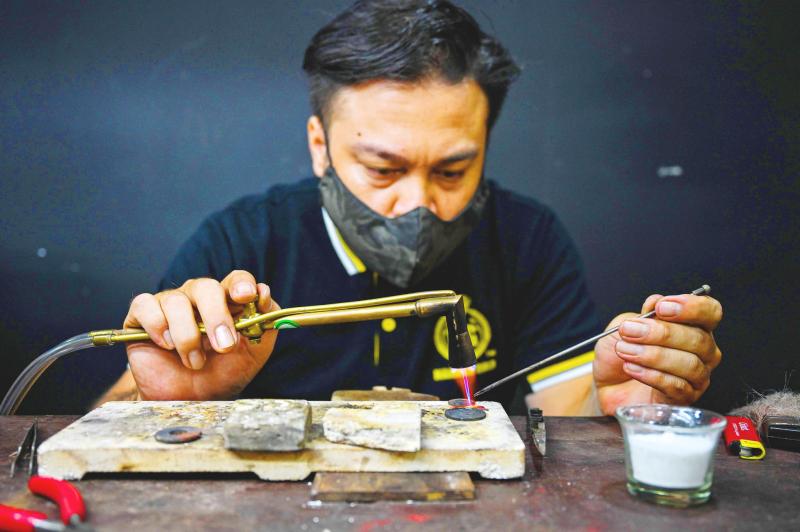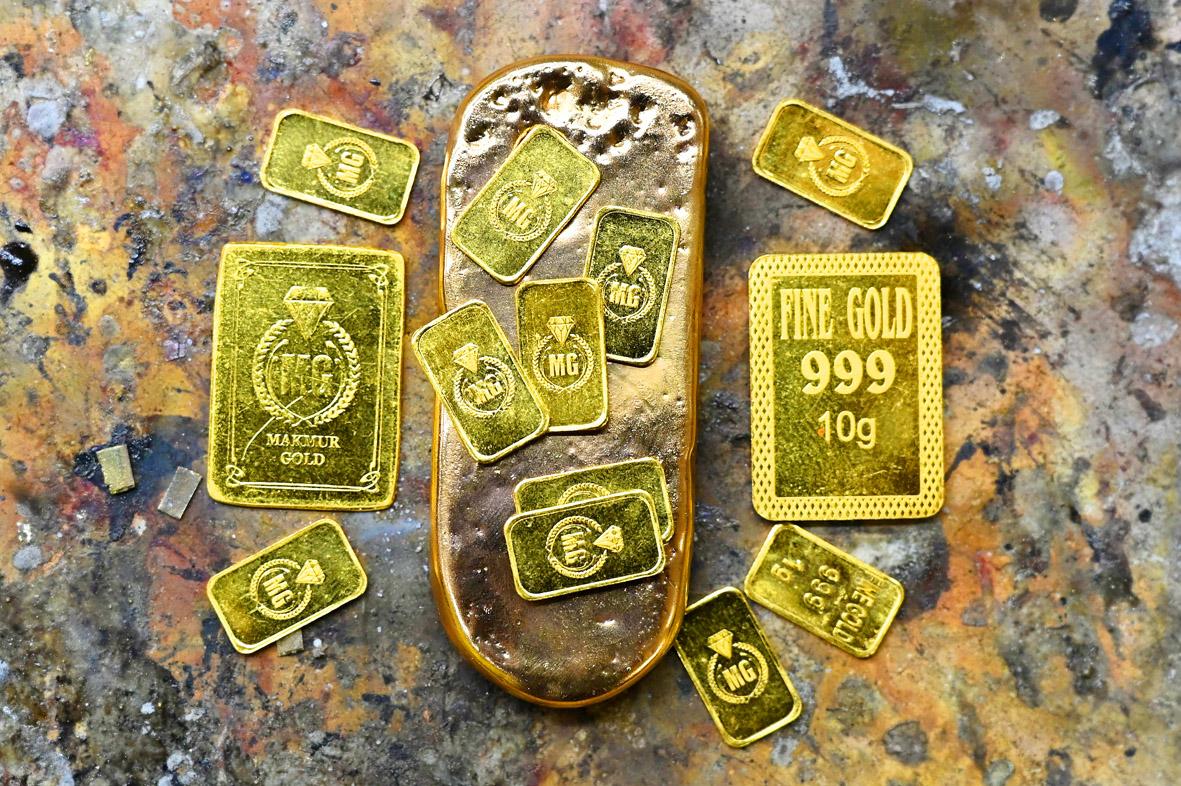In a backroom workshop in Malaysia, goldsmiths with blowtorches and chisels sit at wooden desks as they melt and mold the precious metal into glittery jewelry.
Demand for the safe-haven commodity has soared during the COVID-19 pandemic, and it is not only professional investors who are cashing in, but small businesses, too.
The Makmur Gold Co, which is based in northern Kelantan state and mainly makes jewelry, has enjoyed brisk business this year even as the Southeast Asian nation’s economy fell into recession.

Photo: AFP
“We’ve seen good developments — during COVID-19, our sales were much better,” company director Muhammad Nur Hisyam Che Mahmood said.
Gold surged this year as the pandemic accelerated and stock markets tumbled, hitting a record above US$2,000 an ounce in August, although it has since slipped back to about US$1,800.
Makmur Gold recorded strong sales of about 80 million ringgit (US$19.7 million) over the past eight months as buyers sought to park their cash somewhere safe.

Photo: AFP
The business sells goods directly to customers from its four outlets as well as online, offering items ranging from bracelets and rings to small gold bars. Most of its gold is sourced in the form of jewelry from a small number of suppliers in the country or bought second-hand from customers, before being melted down and fashioned into new products.
In addition to regular customers, the business has agents who sell on its behalf and then keep a share of the profits.
One such agent is Tuan Zubaidah Tuan Abdul Rahman, who made 500,000 ringgit in sales during three months of buying and reselling gold jewelry part-time.
“People are seeing that rather than hold on to their money in the bank, it is better for them to buy gold,” said the woman, who is also a teacher. “People can wear it, and it can be a valuable asset.”
Nurse Nor Fazilah Jamaludin said that she sold gold jewelry during the pandemic to increase her income.
“Women will buy these for beauty, but the benefit of buying gold is more toward our investment for the future,” she said.
Malaysians began rushing to buy gold in May as authorities allowed businesses to reopen after a six-week COVID-19 lockdown, Federation of Goldsmiths and Jewellers Associations of Malaysia president Steven Siow said.
People had extra cash after not spending much for a while and due to a six-month government moratorium on repaying loans aimed at boosting the economy, and gold shops doubled or even tripled their sales, he said.
The gold price has slipped as hopes rise that vaccines are to be rolled out soon, but experts believe that the world economy faces a bumpy recovery and the precious metal is likely to remain a safe bet for some time.
“Gold, in any crisis, would be the key asset to look out for,” said Yeah Kim Leng, an economics professor at Sunway University Business School.

The Eurovision Song Contest has seen a surge in punter interest at the bookmakers, becoming a major betting event, experts said ahead of last night’s giant glamfest in Basel. “Eurovision has quietly become one of the biggest betting events of the year,” said Tomi Huttunen, senior manager of the Online Computer Finland (OCS) betting and casino platform. Betting sites have long been used to gauge which way voters might be leaning ahead of the world’s biggest televised live music event. However, bookmakers highlight a huge increase in engagement in recent years — and this year in particular. “We’ve already passed 2023’s total activity and

Nvidia Corp CEO Jensen Huang (黃仁勳) today announced that his company has selected "Beitou Shilin" in Taipei for its new Taiwan office, called Nvidia Constellation, putting an end to months of speculation. Industry sources have said that the tech giant has been eyeing the Beitou Shilin Science Park as the site of its new overseas headquarters, and speculated that the new headquarters would be built on two plots of land designated as "T17" and "T18," which span 3.89 hectares in the park. "I think it's time for us to reveal one of the largest products we've ever built," Huang said near the

China yesterday announced anti-dumping duties as high as 74.9 percent on imports of polyoxymethylene (POM) copolymers, a type of engineering plastic, from Taiwan, the US, the EU and Japan. The Chinese Ministry of Commerce’s findings conclude a probe launched in May last year, shortly after the US sharply increased tariffs on Chinese electric vehicles, computer chips and other imports. POM copolymers can partially replace metals such as copper and zinc, and have various applications, including in auto parts, electronics and medical equipment, the Chinese ministry has said. In January, it said initial investigations had determined that dumping was taking place, and implemented preliminary

Intel Corp yesterday reinforced its determination to strengthen its partnerships with Taiwan’s ecosystem partners including original-electronic-manufacturing (OEM) companies such as Hon Hai Precision Industry Co (鴻海精密) and chipmaker United Microelectronics Corp (UMC, 聯電). “Tonight marks a new beginning. We renew our new partnership with Taiwan ecosystem,” Intel new chief executive officer Tan Lip-bu (陳立武) said at a dinner with representatives from the company’s local partners, celebrating the 40th anniversary of the US chip giant’s presence in Taiwan. Tan took the reins at Intel six weeks ago aiming to reform the chipmaker and revive its past glory. This is the first time Tan